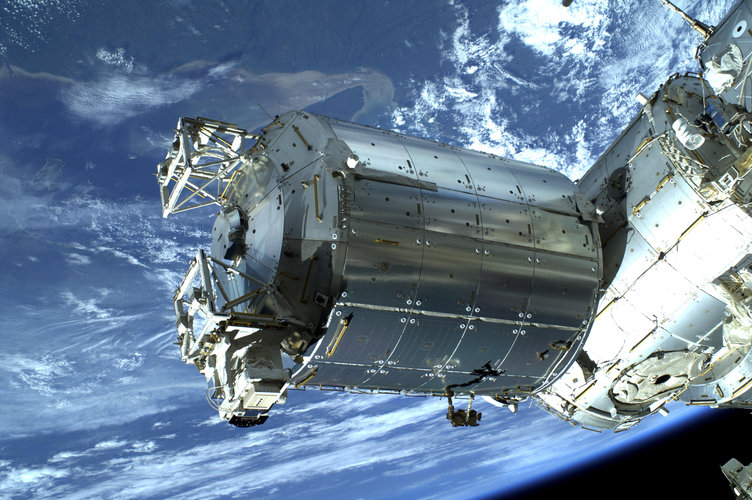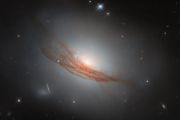
Copernical Team
NASA Tech Instrument Captures Test Images During Blue Ghost Lunar Transit
 Firefly's Blue Ghost Mission 1 has reached the 15th day of its planned 45-day journey to the Moon, marking an important milestone in its transit. Among the key scientific payloads onboard is the Stereo Cameras for Lunar Plume-Surface Studies (SCALPSS) 1.1 instrument, developed at NASA's Langley Research Center in Hampton, Virginia. This sophisticated imaging system is designed to capture high-re
Firefly's Blue Ghost Mission 1 has reached the 15th day of its planned 45-day journey to the Moon, marking an important milestone in its transit. Among the key scientific payloads onboard is the Stereo Cameras for Lunar Plume-Surface Studies (SCALPSS) 1.1 instrument, developed at NASA's Langley Research Center in Hampton, Virginia. This sophisticated imaging system is designed to capture high-re Spacewalkers Complete Radio Hardware Removal and Microbe Search
 NASA astronauts Suni Williams and Butch Wilmore successfully completed a spacewalk at 1:09 p.m. EST on Jan. 30. This marked the ninth spacewalk for Williams and the fifth for Wilmore, contributing to the 274th extravehicular activity (EVA) dedicated to the assembly, maintenance, and upgrades of the International Space Station (ISS).
Notably, Williams set a new milestone by surpassing forme
NASA astronauts Suni Williams and Butch Wilmore successfully completed a spacewalk at 1:09 p.m. EST on Jan. 30. This marked the ninth spacewalk for Williams and the fifth for Wilmore, contributing to the 274th extravehicular activity (EVA) dedicated to the assembly, maintenance, and upgrades of the International Space Station (ISS).
Notably, Williams set a new milestone by surpassing forme China's DeepSeek-R1: A Game-Changing AI Release or Strategic Gesture?
 In a move that has taken the global artificial intelligence (AI) community by surprise, DeepSeek, a private Chinese artificial intelligence company founded in 2023 by entrepreneur Liang Wenfeng, has open-sourced its cutting-edge reasoning model, DeepSeek-R1, alongside detailed scientific documentation and a consumer-facing iOS application.
The release comes amidst a backdrop of intense geo
In a move that has taken the global artificial intelligence (AI) community by surprise, DeepSeek, a private Chinese artificial intelligence company founded in 2023 by entrepreneur Liang Wenfeng, has open-sourced its cutting-edge reasoning model, DeepSeek-R1, alongside detailed scientific documentation and a consumer-facing iOS application.
The release comes amidst a backdrop of intense geo Searching for Water on the Moon: UC San Diego Researchers Uncover Clues to Lunar Water's Origins
 As humanity envisions establishing a permanent presence on the moon, Mars, and beyond, the challenge of sustaining life comes down to the essentials: oxygen, food, and water. While it is well-known that water exists on the moon, pinpointing its exact locations remains a key question. Is it hidden within craters, trapped in the moon's shadowed regions, or concentrated near the poles? Answering th
As humanity envisions establishing a permanent presence on the moon, Mars, and beyond, the challenge of sustaining life comes down to the essentials: oxygen, food, and water. While it is well-known that water exists on the moon, pinpointing its exact locations remains a key question. Is it hidden within craters, trapped in the moon's shadowed regions, or concentrated near the poles? Answering th Will the US get to Mars quicker if it drops or delays plans to visit the Moon?
 The Artemis program has been Nasa's best chance to get "boots on the Moon" again. But with the new US administration taking guidance from tech entrepreneur Elon Musk, who is focused on Mars colonisation, will they end up abandoning or pushing back lunar missions?
For example, there's been speculation that returning US president Donald Trump may cancel the Space Launch System rocket, which
The Artemis program has been Nasa's best chance to get "boots on the Moon" again. But with the new US administration taking guidance from tech entrepreneur Elon Musk, who is focused on Mars colonisation, will they end up abandoning or pushing back lunar missions?
For example, there's been speculation that returning US president Donald Trump may cancel the Space Launch System rocket, which Earth from Space: São Francisco River, Brazil
 Image:
This Copernicus Sentinel-2 image highlights part of the São Francisco River in eastern Brazil.
Image:
This Copernicus Sentinel-2 image highlights part of the São Francisco River in eastern Brazil. Week in images: 27-31 January 2025

Week in images: 27-31 January 2025
Discover our week through the lens
Using AI for more reliable space missions

As we prepare to go deeper into space, the demand for autonomous systems capable of operating independently from ground control and crew interactions is increasing. Artificial Intelligence (AI) is shaping up to be an essential tool for reaching this goal. With support from ESA's Discovery programme, a team of researchers from Airbus explored how AI can collect and analyse data onboard the Columbus module of the International Space Station (ISS) in order to improve its prognosis and fault detection capabilities.
BlackSky secures $100 million contract for next-generation space monitoring capabilities
 BlackSky Technology Inc. (NYSE: BKSY) has signed a seven-year contract exceeding $100 million with a long-standing strategic partner in the international defense sector. The agreement ensures annual capacity minimums for high-resolution, real-time monitoring services using BlackSky's current Gen-2 and upcoming Gen-3 space-based technologies, extending through 2032.
"Dawn-to-dusk, high-cade
BlackSky Technology Inc. (NYSE: BKSY) has signed a seven-year contract exceeding $100 million with a long-standing strategic partner in the international defense sector. The agreement ensures annual capacity minimums for high-resolution, real-time monitoring services using BlackSky's current Gen-2 and upcoming Gen-3 space-based technologies, extending through 2032.
"Dawn-to-dusk, high-cade Adding bridges to stabilize quantum networks
 Entangled photons, a cornerstone of quantum computing and communications, face a significant challenge: they vanish after a single use. To address this, researchers at Northwestern University have proposed a strategy to stabilize quantum networks, ensuring functionality even in dynamic and unpredictable environments. By methodically rebuilding lost connections, the network eventually reaches a s
Entangled photons, a cornerstone of quantum computing and communications, face a significant challenge: they vanish after a single use. To address this, researchers at Northwestern University have proposed a strategy to stabilize quantum networks, ensuring functionality even in dynamic and unpredictable environments. By methodically rebuilding lost connections, the network eventually reaches a s 































